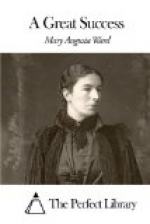The studio in which she worked was on the top of Campden Hill, and opened into one of the pleasant gardens of that neighbourhood. Her uncle, Charles Bentley, an elderly Academician, with an ugly, humorous face, red hair, red eyebrows, a black skull-cap, and a general weakness for the female sex, was very fond of his niece Doris, and inclined to think her a neglected and underrated wife. He was too fond of his own comfort, however, to let Meadows perceive this opinion of his; still less did he dare express it to Doris. All he could do was to befriend her and make her welcome at the studio, to advise her about her illustrations, and correct her drawing when it needed it. He himself was an old-fashioned artist, quite content to be “mid” or even “early” Victorian. He still cultivated the art of historical painting, and was still as anxious as any contemporary of Frith to tell a story. And as his manner was no less behind the age than his material, his pictures remained on his hands, while the “vicious horrors,” as they seemed to him, of the younger school held the field and captured the newspapers. But as he had some private means, and no kith or kin but his niece, the indifference of the public to his work caused him little disturbance. He pleased his own taste, allowing himself a good-natured contempt for the work which supplanted him, coupled with an ever-generous hand for any post-Impressionist in difficulties.
On the August afternoon when Doris, escaping at last from her maids and her accounts, made her way up to the studio, for some hours’ work on the last three or four illustrations wanted for a Christmas book, Uncle Charles welcomed her with effusion.
“Where have you been, child, all this time? I thought you must have flitted entirely.”
Doris explained—while she set up her easel—that for the first time in their lives she and Arthur had been seeing something of the great world, and—mildly—“doing” the season. Arthur was now continuing the season in Scotland, while she had stayed at home to work and rest. Throughout her talk, she avoided mentioning the Dunstables.
“H’m!” said Uncle Charles, “so you’ve been junketing!”
Doris admitted it.
“Did you like it?”
Doris put on her candid look.
“I daresay I should have liked it, if I’d made a success of it. Of course Arthur did.”
“Too much trouble!” said the old painter, shaking his head. “I was in the swim, as they call it, for a year or two. I might have stayed there, I suppose, for I could always tell a story, and I wasn’t afraid of the big-wigs. But I couldn’t stand it. Dress-clothes are the deuce! And besides, talk now is not what it used to be. The clever men who can say smart things are too clever to say them. Nobody wants ’em! So let’s ‘cultivate our garden,’ my dear, and be thankful. I’m beginning a new picture—and I’ve found a topping new model. What can a man want more? Very nice of you to let Arthur go, and have his head. Where is it?—some smart moor? He’ll soon be tired of it.”




